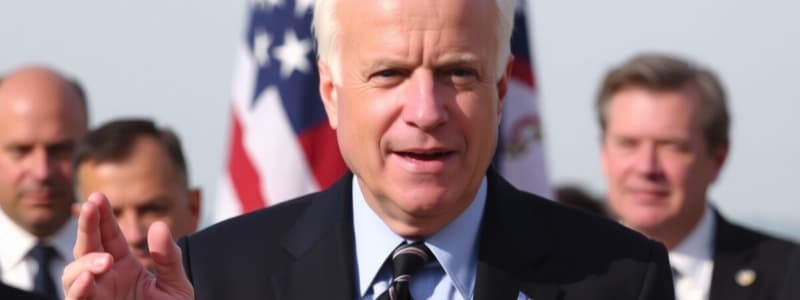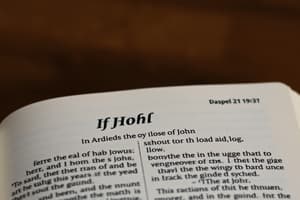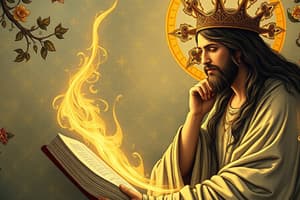Podcast
Questions and Answers
What was the primary reason John McCain could not advance further in his naval career after returning from captivity?
What was the primary reason John McCain could not advance further in his naval career after returning from captivity?
- He chose to prioritize spending time with his family over his career.
- His injuries sustained during captivity permanently impaired his physical abilities. (correct)
- He lacked the necessary academic qualifications for promotion.
- His political views clashed with the Navy's leadership.
Which sequence of events accurately reflects John McCain's career progression after his return to the United States?
Which sequence of events accurately reflects John McCain's career progression after his return to the United States?
- Retirement → Rehabilitation → U.S. Senate → U.S. House of Representatives → Naval service
- Rehabilitation → Naval service → Retirement → U.S. House of Representatives → U.S. Senate (correct)
- Naval service → U.S. House of Representatives → U.S. Senate → Retirement
- U.S. House of Representatives → U.S. Senate → Retirement → Rehabilitation → Naval service
Apart from his military honors, what other achievement significantly contributed to McCain's legacy?
Apart from his military honors, what other achievement significantly contributed to McCain's legacy?
- His establishment of numerous charitable organizations focused on aiding veterans.
- His authorship of several acclaimed books on military strategy.
- His successful business ventures in the beer distribution industry.
- His long-term service as a U.S. Senator representing Arizona. (correct)
What role did John McCain's father-in-law play in his transition from military service to politics?
What role did John McCain's father-in-law play in his transition from military service to politics?
Which of the following best describes the immediate circumstances that led to John McCain's entry into politics?
Which of the following best describes the immediate circumstances that led to John McCain's entry into politics?
John McCain III's family military history primarily involves which branch of the U.S. Armed Forces?
John McCain III's family military history primarily involves which branch of the U.S. Armed Forces?
During which conflict was John McCain III shot down and subsequently captured as a prisoner of war?
During which conflict was John McCain III shot down and subsequently captured as a prisoner of war?
What specific type of aircraft was John McCain III flying when he was shot down over North Vietnam?
What specific type of aircraft was John McCain III flying when he was shot down over North Vietnam?
Why did John McCain refuse early release from the North Vietnamese prison camp, despite the opportunity?
Why did John McCain refuse early release from the North Vietnamese prison camp, despite the opportunity?
Which prison was John McCain held in?
Which prison was John McCain held in?
What was John McCain's squadron before he was captured?
What was John McCain's squadron before he was captured?
What was the name of the Task Force led by McCain's grandfather?
What was the name of the Task Force led by McCain's grandfather?
Before being captured, John McCain escaped serious injury during an incident on what ship?
Before being captured, John McCain escaped serious injury during an incident on what ship?
Flashcards
John McCain's Release Date
John McCain's Release Date
American POW who was released on 14 March 1973, along with other American POWs
John McCain's Vietnam War Awards
John McCain's Vietnam War Awards
Silver Star, Bronze Star, Purple Heart, and Distinguished Flying Cross
Year of McCain's Navy Retirement
Year of McCain's Navy Retirement
1981
McCain's First Political Office
McCain's First Political Office
Signup and view all the flashcards
McCain's Senate Service
McCain's Senate Service
Signup and view all the flashcards
John McCain's Birthplace
John McCain's Birthplace
Signup and view all the flashcards
McCain's Naval Heritage:
McCain's Naval Heritage:
Signup and view all the flashcards
McCain's Academy Graduation
McCain's Academy Graduation
Signup and view all the flashcards
Vietnam War Assignment
Vietnam War Assignment
Signup and view all the flashcards
Shot Down Over Hanoi
Shot Down Over Hanoi
Signup and view all the flashcards
POW Captivity
POW Captivity
Signup and view all the flashcards
Refusal of Early Release
Refusal of Early Release
Signup and view all the flashcards
Length of Captivity
Length of Captivity
Signup and view all the flashcards
Study Notes
- John Sidney McCain III was born on August 29, 1936, at Coco Solo Naval Air Station in the Panama Canal Zone.
- He died on August 25, 2018.
- His parents were Admiral John S. McCain, Jr., and Roberta McCain.
- His father commanded two submarines during World War II and received the Silver Star and Bronze Star.
- Significant assignments of his father after World War II include Commander, Amphibious Force, Atlantic Fleet, and commander in chief of U.S. Naval Forces Europe and U.S. Pacific Command.
- His paternal grandfather, Admiral John S. McCain, Sr., commanded the South Pacific Force during the 1942 Solomon Islands campaign.
- His grandfather was commander of Carrier Task Force 38.1 and saw continuous combat action during World War II.
- McCain enrolled at the U.S. Naval Academy in Annapolis, Maryland, and graduated in 1958.
- He graduated from flight school in 1960 as a naval aviator.
- With the outbreak of the Vietnam War, McCain was assigned to Attack Squadron (VA) 46 on board USS Forrestal (CVA-59).
- He flew his A-4 Skyhawk on bombing runs against the North Vietnamese.
- On July 29 1967, the USS Forrestal suffered a catastrophic fire during flight operations, killing 134 crewmembers.
- On October 26 1967, during his 23rd mission, McCain's plane was shot down during a bombing run over Hanoi.
- While ejecting, both of his arms were broken and his right knee shattered.
- McCain was captured by the North Vietnamese and moved to Hoa Loa Prison (nicknamed the “Hanoi Hilton”), then to a hospital, and then to a prison camp known as "The Plantation".
- During his captivity, his captors learned he was the son of a high-ranking officer and offered him an early release.
- McCain refused release, knowing the North Vietnamese would use it as propaganda, citing the military Code of Conduct.
- McCain spent five and a half years as a prisoner of war with three and a half of those years in solitary confinement.
- During his years of captivity, he was repeatedly beaten, tortured, and subjected to psychological torment.
- On March 14 1973, he was released, along with other American POWs.
- He was awarded the Silver Star, Bronze Star, Purple Heart, and Distinguished Flying Cross for his Vietnam service.
- After the war, McCain was determined to continue as a naval aviator, but lost most of his physical strength and flexibility.
- After nine months of rehabilitation, McCain returned to flying, but it became clear that his injuries had permanently impaired his ability to advance in the Navy.
- He retired from the service in 1981.
- After he retired from the Navy, McCain moved to Phoenix, Arizona, with his wife.
- While working in public relations for his father-in-law's beer distribution business, he began to make political connections.
- McCain was first elected to a political office on 2 November 1982, winning a seat in the U.S. House of Representatives.
- He was reelected in 1984.
- In 1986, with the retirement of Barry Goldwater, McCain won a seat on the U.S. Senate.
- He represented Arizona as a U.S. senator until his death on 25 August 2018 at age 81.
- His life's work lives on through organizations and causes, including the McCain Institute at Arizona State University and the USS John S. McCain (DDG-56).
- McCain is buried at the U.S. Naval Academy.
Studying That Suits You
Use AI to generate personalized quizzes and flashcards to suit your learning preferences.




